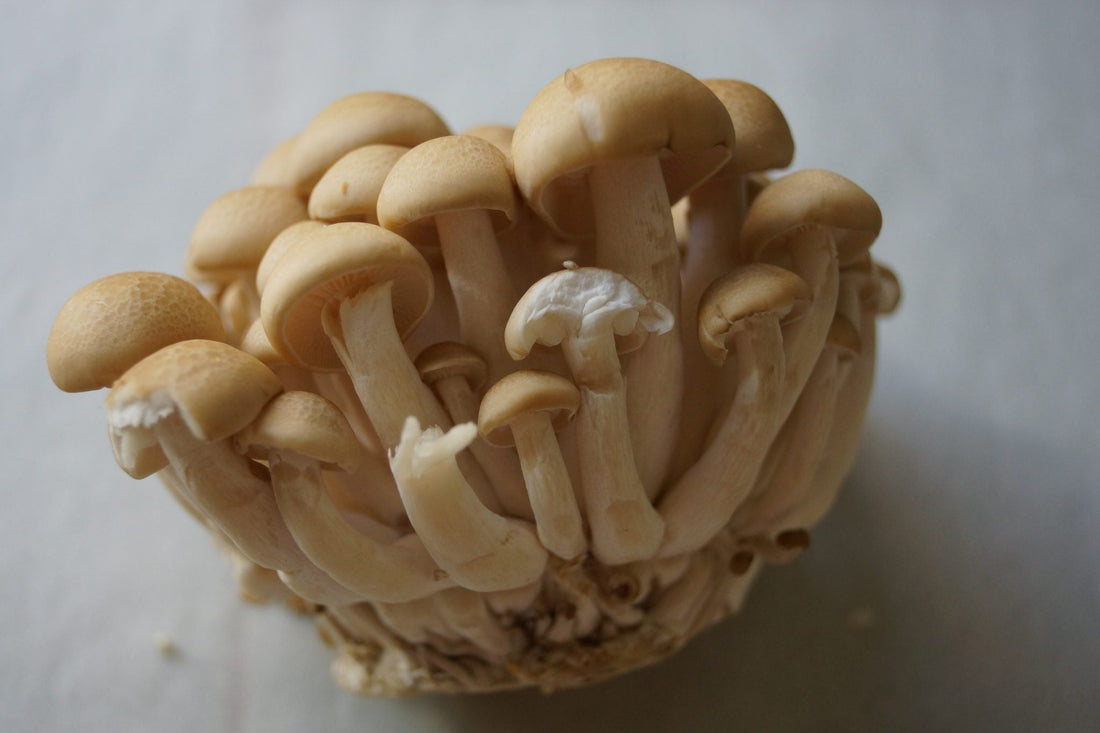Shimeji mushrooms are a type of medicinal mushroom native to the humid forests of Japan. These strange-looking fungi have recently been gaining popularity in the health and wellness community, but what exactly makes shimeji mushrooms so special?
In this article you will learn everything you need to know about Shimeji mushrooms: their benefits, nutrition profile, how to cook with them, and where to find them.
Shimeji mushrooms are a lesser-known variety of edible mushroom used primarily for its medicinal properties. They’re prized for their antibacterial properties, high levels of antioxidants and immune boosting properties.
Are Shimeji Mushrooms Good For You?
Yes, Shimeji mushrooms are one of the most nutritious varieties of mushrooms. They are high in fibre, vitamins and minerals, particularly B vitamins and iron. These mushrooms contain significant amounts of vitamin D, an essential vitamin that is usually low in the winter months and during the year for most people.
Vitamin D is needed for strong bones and muscles, and it may also help prevent or control diabetes, cancer, heart disease, and high blood pressure.
Shimeji mushrooms also have high amounts of selenium, a mineral that is crucial for thyroid health. The thyroid gland produces hormones that regulate metabolism and growth, and selenium is crucial for maintaining proper thyroid function.
Lastly, shimeji mushrooms are also a good source of zinc, which is important for immune health, wound healing, and promoting a healthy appetite.
What Are Shimeji Mushrooms?
Shimeji mushrooms are a type of edible mushroom native to the humid forests of East Asia but also cultivated in North America, Europe, and Australia. They are dark brown with a light brown stem and white spore print.
Unlike other common varieties of mushrooms, Shimeji mushrooms do not grow in soil but on the trunks of trees. You can find them in the wild in the fall months, or you can purchase them at Xotic Mushrooms Melbourne.
There are several varieties of this fungi but the most popular ones are:
- White shimeji also known as white beech mushroom, white clamshell mushroom, or Bunapi-shimeji;
- Brown shimeji, also called brown beech, brown clamshell, or Buna-shimeji mushrooms.
Nutrition Value of Shimeji Mushrooms
Shimeji mushrooms have a low amount of calories and a high amount of protein.
One cup of sliced shimeji mushrooms also contains around 50.10 grams of carbohydrates which is a moderate amount that is good for energy.
Here’s a table with other nutrition values as reported by foodtheis:
|
Nutrient |
Amount per gram |
|
Protein |
33.89 g |
|
Fiber |
13.20 g |
|
Carbohydrate |
50.10 g |
|
Potassium |
1575 mg |
|
Calcium |
98 mg |
|
Phosphorus |
568 mg |
|
Iron |
18 mg |
|
Zinc |
5 mg |
6 Health Benefits of Eating Shimeji Mushrooms
Shimeji mushrooms have many health benefits.
One of the most notable is their anti-bacterial properties. Shimeji mushrooms are believed to have antioxidant properties that may help prevent cell damage, which can lead to certain types of cancers.
They also help regulate blood sugar levels and promote digestive health.
As shimeji mushrooms are also a significant source of Vitamin B-2, they are a great energy booster. Vitamin B-2 is also good for your skin and immune system.
These mushrooms are also low in cholesterol and contain dietary fiber that promotes fecal excretion of bile acids and reduced insulin response.
As if that’s not enough, shimenji mushrooms are rich in the following compounds:
- Glycoprotein (HM-3A)
- Marmorin
- Beta-(1-3)-glucan
- Hypsiziprenol
- Hypsin
The above-named compounds act as anticancer agents that help prevent the generation of various cancer cells including leukemia, hepatoma, breast, sarcoma, and lung carcinoma cells.
Shimeji mushrooms may be beneficial in treating inflammatory bowel disease (IBD), as they contain polysaccharides that have anti-inflammatory properties.
Ways To Incorporate Shimeji Mushrooms Into Your Diet
Shimeji mushrooms are great for stir-frying, seasoning soups or casseroles, or even eaten raw.
Shimejii mushrooms contain a lot of water, and so they will be bland if not cooked with enough seasoning.
A good way to ensure that shimejii mushrooms are properly cooked is to pre-sauté them in a bit of oil with some spices and then add liquid towards the end of cooking. Shimejii mushrooms can also be used as a substitute for portobello mushrooms, but may need to be sliced thinner than usual.
Shimejii mushrooms are great for adding texture and flavour to dishes. You can sauté them with greens, add them to soups and stews, or even put them on top of pizza.
You can also use shimeji mushrooms as an alternative to mushrooms in salads, sandwiches, burgers and more. There are also many shimeji mushroom recipes online if you want to try cooking with them!
Where to Find Shimeji Mushrooms
Shimeji mushrooms are available in Australian grocery stores, some farmers’ markets or Whole Foods throughout the fall months. You can also order shimeji mushrooms online at Xotic Mushrooms Melbourne.
Shimeji mushrooms are a difficult mushroom to grow in temperate regions, so they are a bit more expensive than other varieties.
When purchasing shimeji mushrooms, make sure they are firm, and have no signs of wilting or sponginess. Keep shimeji mushrooms refrigerated in a closed container and use them within a few days.
Final Thoughts
Shimeji mushrooms are a delicious and nutritious variety of mushroom that can be used in a variety of dishes. They are high in fibre, Vitamin D, B2, and iron, and contain significant amounts of selenium and zinc.
They are an excellent source of energy, and they can be added to many different types of dishes, including soups, stews, salads, sandwiches, and even on top of pizza! If you want to try shimeji mushrooms, be sure to purchase them in the fall months, and keep them refrigerated in a closed container.



















